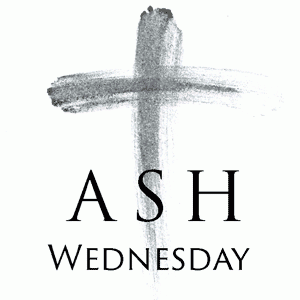The History and Meaning of Ash Wednesday
Ash Wednesday is the name given to the first day of the season of Lent, in which the priest or minister applies ashes to the foreheads of Christians to signify an inner repentance. But what is the meaning and history of this Christian holy day?
![Ash-Wednesday-cross.gif]
( )
)
Ash Wednesday, originally called dies cinerum (day of ashes) is mentioned in the earliest copies of the Gregorian Sacramentary, and probably dates from at least the 8th century. One of the earliest descriptions of Ash Wednesday is found in the writings of the Anglo-Saxon abbot Aelfric (995-1020). In his Lives of the Saints, he writes, “ We read in the books both of the Old Law and in the New that the men who repented of their sins bestrewed themselves with ashes and clothed their bodies with sackcloth. Now let us do this little rite at the beginning of our Lent that we strew ashes upon our heads to signify that we ought to repent of our sins during the Lenten fast.”
As Aelfric suggests, the pouring of ashes on one’s body (and dressing in sackcloth, a very rough material) as an outer manifestation of inner repentance or mourning is an ancient practice. It is mentioned several times in the Old Testament. What is probably the earliest occurrence is found at the very end of the book of Job. Job, having been rebuked by God, confesses, “ Therefore I despise myself and repent in dust and ashes”(Job 42:6). Other examples are found in 2 Samuel 13:19, Esther 4: 1,3, Isaiah 61:3, Jeremiah 6: 26, Ezekiel 27:30, and Daniel 9:3. In the New Testament, Jesus alludes to the practice in Matthew 11:21: “ Woe to you, Korazin! Woe to you, Bethsaida! If the miracles that were performed in you had been performed in Tyre and Sidon, they would have repented long ago in sackcloth and ashes.”
In the typical Ash Wednesday observance, Christians are invited to the altar to receive the imposition of ashes, prior to receiving the Holy Supper (Eucharist). The priest or minister applies ashes in the shape of the cross on the forehead of each, while speaking the words, “For dust you are and to dust you shall return” (Genesis 3:19). This is, of course, what God spoke to Adam and Eve after they had eaten of the forbidden fruit and fallen into sin. These words indicated to our first parents the bitterest fruit of their sin, namely death. In the context of the Ash Wednesday imposition of ashes, they remind each penitent of their sinfulness and mortality, and, thus, their need to repent and get right with God before it is too late. The cross reminds each penitent of the good news that through Jesus Christ crucified there is forgiveness of all sins, all guilt, and all punishment.
Many Christians choose to leave the ashes on their forehead for the remainder of the day, not to be showy or boastful (see Matthew 6: 16-18). Rather, they do it as a witness that all people are sinners in need of repentance and that through Jesus all sins are forgiven through faith.
Ash Wednesday, like the season of Lent, is meaningless, even hypocritical, unless there is a corresponding inner repentance and change of behavior. This is made clear in Isaiah 58:5-7 when God says,
“Is this the kind of fast I have chosen, only a day for a man to humble himself? Is it only for bowing one’s head like a reed and for lying on sackcloth and ashes? Is that what you call a fast, a day acceptable to the Lord? (Verse 6) Is not this the kind of fasting I have chosen: to loose the chains of injustice and untie the cords of the yoke, to set the oppressed free and break every yoke? (Verse 7) Is it not to share your food with the hungry and to provide the poor wanderer with shelter – when you see the naked, to clothe him, and not to turn away from your own flesh and blood?”
With this in mind, however, the rite of ashes on Ash Wednesday is heartily recommended to the Christian as a wonderful opportunity for repentance and spiritual renewal within the framework of confession and absolution (The Sacrament of Reconciliation).
Thank you for reading.
@kyrian done.